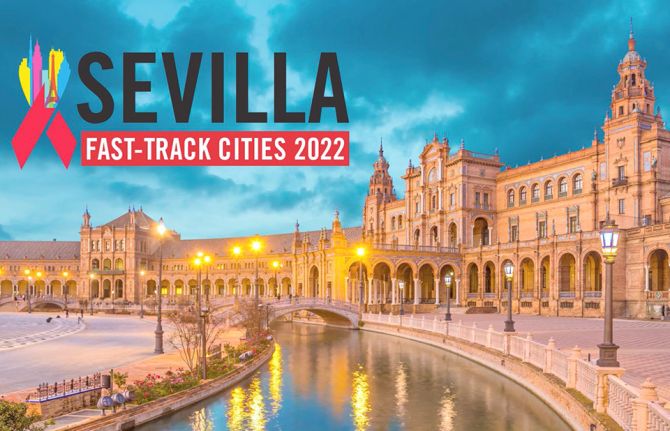

Feature Story
Sevilla Declaration on the centrality of affected communities in urban HIV responses unveiled at Fast-Track Cities 2022 conference
11 October 2022
11 October 2022 11 October 2022At a Fast-Track Cities 2022 conference reception held today in Seville, Spain, several Mayors and a Deputy Governor in attendance were joined virtually by peers from across the Fast-Track Cities network to sign their names to a declaration aimed at defining and facilitating the placement of affected communities at the center or urban HIV responses.
- The Mayors of Blantyre (Wild Ndipo), Kingston (Delroy Williams), Libreville (Issa Malam Salatou), Quezon City (Ma. Josefina Belmonte), and Sevilla (Antonio Muñoz Martínez) signed the Sevilla Declaration on the Centrality of Affected Communities in Urban HIV Responses (Sevilla Declaration) along with Johannesburg Mayor (Dada Morero), New York City Mayor Eric Adams, and other Mayors who participated via video or virtually.
- The Deputy Governor of the Bangkok Metropolitan Administration (Dr. Tavida Kamolvej) also affixed her signature to the declaration during the Sevilla ceremony, and a representative from GGD Amsterdam signed on behalf of that city’s Mayor (Femke Halsema). Multiple county and provincial officials from Fast-Track Cities in other countries also signed the declaration via video or virtually.
- Moreover, Mayors and representatives from an additional 22 Fast-Track Cities in Spain signed the declaration. Of note, the reception’s signing ceremony was witnessed by Carolina Darias, Minister of Health of Spain, in whose country more than 150 cities have joined the Fast-Track Cities network, with Sevilla having been the first Spanish city to sign the Paris Declaration on Fast-Track Cities Ending the HIV Epidemic in 2015.
According to Dr. José M. Zuniga, President/CEO of the International Association of Providers of AIDS Care and the Fast-Track Cities Institute, the Sevilla Declaration will supplement the Paris Declaration on Fast-Track Cities, which more than 400 cities and municipalities worldwide have signed since the network’s launch in 2014, thus joining the Fast-Track Cities network. The new declaration includes 10 commitments Fast-Track Cities are asked to make that range from safeguarding the dignity and rights of communities affected by HIV to meeting the United Nations goals for community-led HIV responses.
“An amorphous and overly malleable term such as ‘placing people at the center’ of the HIV response has little effect if it can be interpreted in a million different ways or worse actioned as mere tokenism that disenfranchises those whose voice at the table and leadership are critically needed,” said Dr. Zuniga. “The 10 commitments that Fast-Track Cities are making in signing the Sevilla Declaration reflect an important step forward in clearly defining, operationalizing, and facilitating what we mean by ‘placing people at the center’ of urban HIV responses at a time when it is most critical to do so.”
The Sevilla Declaration was shaped by organizations representing people living with HIV, including the Global Network of People Living with HIV (GNP+), as well as through regional listening sessions involving local communities of people living with HIV across the Fast-Track Cities network. Also providing input were the four core partners of the Fast-Track Cities initiative: IAPAC, the Joint United Nations Programme on HIV/AIDS (UNAIDS), United Nations Human Settlements Programme (UN-Habitat), and the City of Paris.
“The Sevilla Declaration provides structure for communities of people living with HIV to more formally play a leadership role in HIV responses at city and municipal levels,” said Sbongile Nkosi, Co-Executive Director of GNP+, which formally endorsed the declaration at the Fast-Track Cities 2022 conference. “We talk a lot about ‘placing people at the center of the HIV response,’ but the Sevilla Declaration does more by articulating commitments local governments and institutions must make to create the space for and empower people living with HIV and their community-based organizations to lead urban HIV responses.”
In its Global AIDS Strategy, 2021-2026, UNAIDS emphasizes the critical nature of community engagement and leadership to regain momentum against HIV that was lost during the COVID-19 pandemic. Through its advocacy on community engagement, UNAIDS has consistently stressed that the call for “nothing for us without us” must be made more than just a slogan.
“In line with the Global AIDS Strategy and the Sevilla Declaration, empowering and integrating community engagement is the cornerstone to ending AIDS and having people at the center of the response, said UNAIDS Deputy Executive Director for Programme, Eamonn Murphy.



